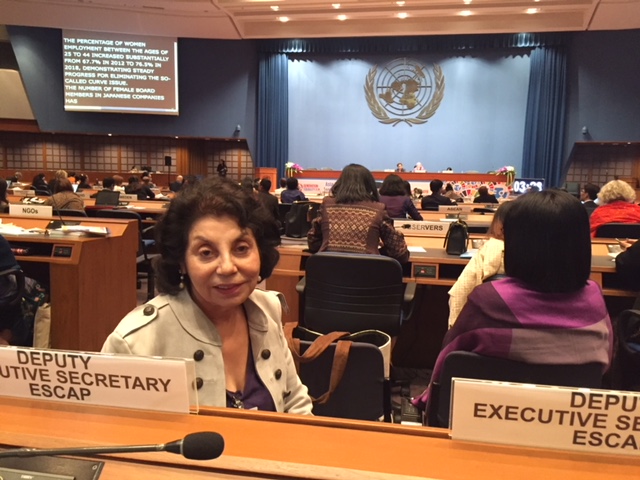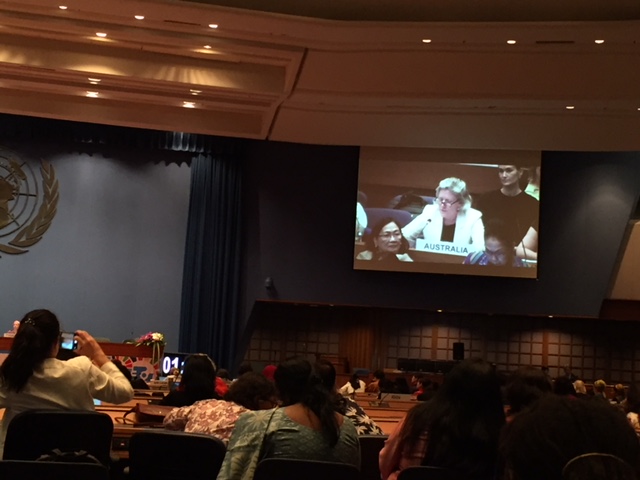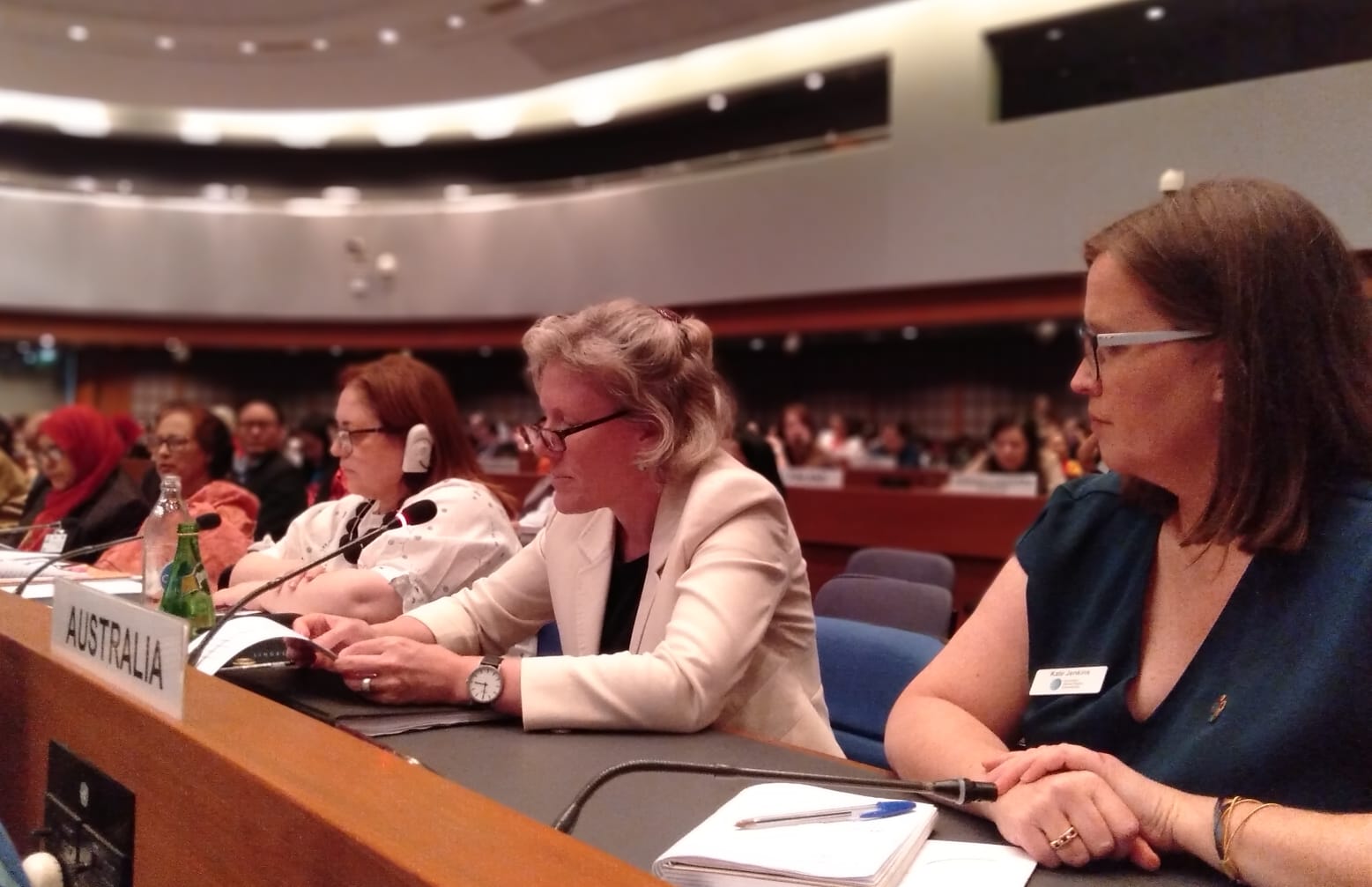Civil society statement delivered to Intergovernmental Meeting
– Bangkok Beijing +25
Dr Manjula OConnor attended the Bangkok Asia Pacific meeting as representative of ACHRH and Harmony Alliance along with eight other civil society organisations under the umbrella of Asia Pacific Watch This is a brief summary of the first three days .
More than 300 NGO s from the Asia Pacific Region met and discussed the 25 years of progress after the 1995 Beijing declaration and Platform for Action to progress human rights of women and enhance gender equality
Over a three day forum of deliberations held from 24-26 November a lot of reflection occurred. Anger at unmet goals , hope at progress made and potential of future progress and collection of possible actions . A combined statement was drafted. The short version was read to the 45 high level Governments Representatives on 27 November . The young feminist Ms Vica Larasati delivered the statement to the Intergovernmental l Meeting on behalf of the civil society participants
You can watch video of the opening session including the civil society statement (from about 46mins 20secs into the video) here:
Thanks for the work done on this by all the civil society forum participants, and particularly the organising committee and drafting group, including Carole Shaw and Romy Listo.



Civil Society Statement on Beijing+25 Review Intergovernmental Meeting
27 November, 2019
Bangkok Thailand
Vica Larasati Speaks At Beijing+25 Review Intergovernmental Meeting
Thank you, Chair. My name is Vica Larasati.
I speak on behalf of over 300 feminists from 35 countries who attended the Asia and the Pacific Civil Society Forum and the Young Feminists’ Forum for the review of 25 years of implementation of the Beijing Declaration and Platform for Action. Together we represent 250 organizations and networks, including women human rights defenders and grassroots activists.
We are women and young people of diverse identities, of all ages, sexual orientations, gender identities and expression, and sex characteristics. We are women discriminated by caste, class, ethnicity. We are from Dalit, indigenous, tribal, minority communities. We belong to diverse faiths and religions. We are rural women, farmers, documented and undocumented migrant workers, informal economy workers, sex workers, domestic workers, refugees, asylum seekers, stateless women. We are women with disabilities, we are living in institutions. We are single women, women living with HIV, women affected by conflict and internally displaced women.
And we are angry…
The spaces for our engagement on women’s human rights are shrinking.
Despite 25 years since Beijing, we are far from reaching gender equality.
Inequalities of wealth, power and resources are immense. Human rights being trumped by corporate rights – our lands and resources are grabbed.
We are alarmed with the pushbacks on the Women, Peace and Security Agenda,
We are appalled with the regression on Sexual and Reproductive Health and Rights (SRHR)
We are enraged with the instrumentalization of our bodies and labour.
We are distrubed by the rise of religious fundamentalisms, macho and militaristic nationalisms.
We are extremely concerned with increased surveillance and targeting of women human rights defenders.
Our region, the largest and most diverse in the world, is currently reeling under the impact of climate crises and intensifying natural disasters.
This is in addition to the onslaught of the last 30 years of neoliberal regimes where trade liberalization has robbed us of our food sovereignty and privatization of services has denied us access to education and health.
We experience everyday misogyny and pandemic proportions of violence within our homes, at work and in public spaces.
Today, we present our vision of development justice and peace that is redistributive in nature and ensures accountability to the peoples.
Today, we come to you with the HOPE that you will ACT on our concrete recommendations.
25 years on…it is time for system change.
Time to:
Re-focus, prioritise and accelerate actions to remove structural and systemic barriers;
Invest equitable resources for women’s rights and gender equality agenda instead of flowing the resources to militarisation and nuclearisation.
Strengthen the gender architecture and accountabilities at all levels.
Involve us as equal partners in agenda-setting and decision-making. Within politics, policy-making and peace processes.
Uphold sexual and reproductive health and rights including access to safe abortion.
Fulfill commitments of women peace and security agenda in line with 1325 and subsequent resolutions.
Recognize the failure of the neoliberal economic policies and the immense damage on women’s lives and livelihoods – which needs to be urgently reversed.
Climate Emergency is real. Governments in Asia and the Pacific must play a leading role in driving the discussions on climate crisis and upholding the principle of common but differentiated responsibilities. We need a just and equitable transition from extractive-profit and fossil fuel based economy to feminist fossil fuel free futures that are human rights-based and led by communities.
We strongly urge Member States to:
Ensure the primacy of human rights in trade and investment agreements, through gender, human rights and environmental impact assessments. And remove the Investor State Dispute Settlement mechanisms from all trade and investment agreements and treaties.
Support the process for a legally binding treaty on transnational corporations and other business enterprises at the Human Rights Council.
Advocate for the creation of a global architecture to prevent tax evasion and avoidance, and to tackle illicit financial flows.
Ensure social protection, wage security, freedom from violence and harassment, and right to association of all workers – in the formal and informal economy, including migrant workers, domestic workers and women farmers.
Recognise, reduce and redistribute women’s unpaid work through state investments in universal social protection, public services and gender-responsive infrastructure.
6. Promote and protect women’s ownership, use and control of land, water, seeds, commons, and traditional and indigenous knowledge systems, and ensure food sovereignty.
Ensure universal health care for all, including in humanitarian settings.
Decriminalise abortion and sex work. Review policies and laws that conflate sex work and human trafficking, since they are not the same.
End discriminatory laws and practices that perpetuate violence, legitimize child marriage, criminalize consent in relation to sexual autonomy of young people; and also those that maintain inequalities in inheritance, citizenship, nationality, marriage and its dissolution.
Enforce age-appropriate, evidence, and rights-based, and accessible Comprehensive Sexuality Education (CSE) for all, both in and out of schools.
Conduct human rights and gender-responsive assessment of the digital economy, technology and innovation and its implications for women.
Review and strengthen national frameworks on gender and disability inclusion ensuring representation of women and girls with diverse disabilities
Produce and disseminate high quality reliable data, disaggregated by sex and gender below the household-level, and by differential axes of marginalisations, reflective of multiple and intersecting forms of discrimination and vulnerabilities.
We, the women and young people of Asia and the Pacific are confident that you will take bold steps in translating Beijing commitments and our recommendations into actions that will fundamentally transform our lives. And we trust that you will not let us down.
The Australian Government Responded to the civil society statement by acknowledging the central role of gender equality in all their policies . The Government values input made by women leaders of civil society organisations and issues concerning women from all segments of society and those of culturally and linguistically diverse groups
Country Statement by Australia’s Head of Delegation, Catherine Hawkins
Asia-Pacific Ministerial Conference on the Beijing+25 Review
Madam Chair, Distinguished colleagues
It is my privilege to address you today, and to represent the Australian Government and the Minister for Foreign Affairs and Minister for Women, Senator the Hon. Marise Payne, on this important occasion.
The empowerment of women and girls is critical to economic prosperity, sustainable development, and to more peaceful and stable societies. While significant progress has been made in our Indo-Pacific region there is more to be done.
We must redouble our efforts to break down the barriers to women’s full and meaningful participation in all areas of life.
The Australian Government is committed to ensuring women are safe, economically empowered, and supported in their leadership aspirations.
Key Achievements
We are taking vital steps to end violence against women and their children.
This year, the Australian Government made the largest ever investment in prevention and frontline services, to support the Fourth Action Plan of the National Plan to Reduce Violence against Women and their Children 2010-2022.
The Fourth Action Plan places an emphasis on primary prevention, to stop violence before it starts. It also elevates the importance of addressing the diverse and lived experience of women who have experienced family and domestic violence, and supporting Aboriginal and Torres Strait Islander women and their children.
To protect the safety of women in our workplaces, the Australian Human Rights Commission has launched a world first national inquiry into sexual harassment in the workplace.
We know there’s a discrepancy between men and women in doing unpaid work, and that it is a driver of the gender pay gap. Women who forgo paid work are likely to experience lower long-term economic security than their working peers. So Australia is restoring a national Time Use Survey to help us better understand the distribution of unpaid work between men and women.
In 2018, Australia introduced its inaugural Women’s Economic Security Statement. This package of initiatives aims to promote greater choice for Australian women, including by improving women’s skills and employability, encouraging their return to paid work, and assisting them to establish their own businesses. The Government has committed to deliver a second Women’s Economic Security Statement.
A healthy community draws on the strengths of women leaders. Australia’s Minister for Women has initiated a national series of roundtable meetings with grassroots organisations and community leaders to hear their voices on gender equality, women’s economic security, safety and leadership.
The Australian Government also works closely with six National Women’s Alliances to ensure that policy-makers can hear the voices of Australian women, in particular those from marginalised and disadvantaged groups.
We must understand and respond to the needs of women and girls in all their diversity. Indigenous women, women with disability, LGBTQI peoples, women from culturally and linguistically diverse backgrounds; all bring different perspectives and experiences.
Strong government links with civil society are vital. I’m proud that our delegation to this conference includes three civil society colleagues, and that many others from our civil society community are with us here.
Through the Australian Government’s Gender Equality and Women’s Empowerment Strategy (2016) and the Foreign Policy White Paper, we also pursue gender equality as a core Australian value and a top priority across Australia’s foreign policy, economic diplomacy and development initiatives, including in the Indo-Pacific region.
Madam Chair
Gender equality is a fundamental human right, and respecting fundamental human rights and freedoms makes Australia and the world safer, secure and more prosperous. The 1995 Beijing Declaration and Platform for Action remains a touchstone for the global community in advancing the rights of women and girls and realising gender equality. It’s right that we take the time to celebrate our achievements, acknowledge the challenges we still face, and renew our commitments.
While no country has yet achieved gender equality, there is much we can learn from each other.
When we work together, our efforts are amplified and women’s voices throughout our Indo-Pacific region grow stronger. Thank you.


No comment yet, add your voice below!